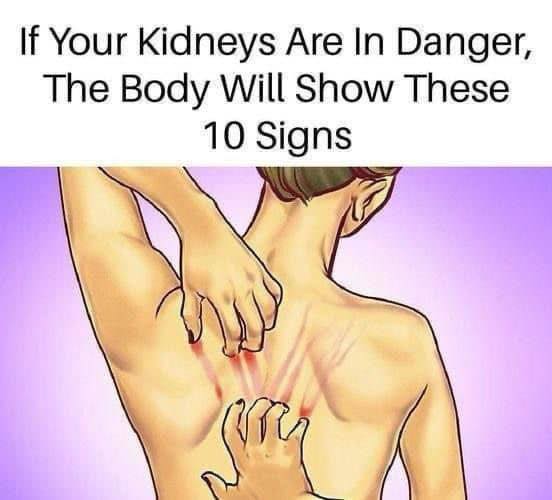ADVERTISEMENT
### 5. Shortness of Breath
Fluid overload from kidney dysfunction can accumulate in the lungs, causing difficulty breathing. Anemia also reduces oxygen-carrying capacity.
**Symptoms:**
* Breathlessness during minimal activity or at rest
* Chest tightness
—
### 6. High Blood Pressure
Kidneys regulate blood pressure by managing fluid and salt balance and producing hormones.
**What happens:**
Damaged kidneys may cause or worsen hypertension, which in turn damages kidneys further — creating a vicious cycle.
—
### 7. Metallic Taste and Ammonia Breath
Waste buildup can alter taste perception and cause bad breath with ammonia-like odor.
**Symptoms:**
* Food tastes metallic or different
* Persistent bad breath, not related to dental hygiene
—
### 8. Nausea and Vomiting
Accumulation of waste toxins (uremia) can irritate the stomach and cause digestive upset.
**Signs:**
* Nausea without clear cause
* Vomiting, especially if persistent
—
### 9. Difficulty Concentrating and Mental Confusion
Kidney disease can cause a buildup of toxins affecting the brain, leading to cognitive difficulties.
**Symptoms:**
* Trouble focusing
* Memory problems
* Feeling “foggy” or confused
—
### 10. Pain in the Back or Side Below the Ribs
Pain in the kidney area may indicate an infection, stones, or other kidney issues.
**Warning:**
Severe or persistent pain should prompt immediate medical evaluation.
—
## What Causes Kidney Problems?
Understanding the causes can help with prevention and management.
### Common Causes Include:
* **Diabetes:** High blood sugar damages nephrons over time.
* **Hypertension:** High blood pressure damages blood vessels in kidneys.
* **Chronic urinary tract infections** or blockages.
* **Autoimmune diseases** like lupus.
* **Polycystic kidney disease:** Genetic disorder causing cysts in kidneys.
* **Kidney stones:** Can cause blockages and infections.
* **Certain medications:** Prolonged use of NSAIDs or other nephrotoxic drugs.
—
## How to Protect Your Kidneys
Here are practical tips to keep your kidneys healthy:
* **Stay hydrated:** Drink enough water daily.
* **Control blood sugar:** Especially if diabetic.
* **Manage blood pressure:** Maintain healthy BP levels.
* **Avoid excessive salt:** High salt intake stresses kidneys.
* **Eat a kidney-friendly diet:** Rich in fruits, vegetables, and low in processed foods.
* **Avoid smoking and limit alcohol:** Both damage kidneys.
* **Exercise regularly:** Helps control weight and blood pressure.
* **Avoid overuse of painkillers:** NSAIDs can harm kidneys.
* **Get regular health checkups:** Early detection through blood and urine tests.
—
## When to See a Doctor
If you experience any of the warning signs described, especially multiple signs or persistent symptoms, consult a healthcare professional promptly.
Regular screening is important if you have risk factors like diabetes, hypertension, family history, or are over 60.
—
## Diagnosis and Treatment
Doctors use tests like:
* **Blood tests:** To check creatinine, BUN, and estimated glomerular filtration rate (eGFR).
* **Urine tests:** For protein, blood, or abnormal substances.
* **Imaging:** Ultrasound or CT scan to assess kidney structure.
* **Biopsy:** In some cases, to diagnose specific diseases.
Treatment depends on the cause but may include medications, lifestyle changes, dialysis, or transplant in advanced stages.
—
## Conclusion
Kidneys are vital for your health, yet their problems often remain hidden until advanced. Knowing the 10 warning signs — from changes in urination to fatigue and swelling — can help you detect kidney trouble early. Coupled with lifestyle changes and regular medical checkups, you can protect your kidneys and overall well-being.
Don’t ignore the signals your body sends. Early action can make a life-changing difference.
—
If you want, I can help create a checklist or printable guide with these warning signs and tips for your reference! Would you like that?
